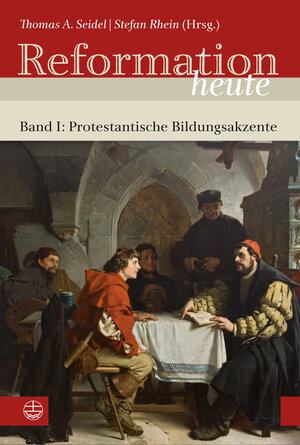
×
![Buchcover ISBN 9783374038046]()
Reformation heute
Band I: Protestantische Bildungsakzente. Hrsg. von Christopher Spehr
herausgegeben von Thomas A. Seidel und Stefan RheinProtestantismus und Bildung sind aufeinander bezogen. Bildung wird gemeinhin sogar als Erkennungsmerkmal des Protestantismus bestimmt. Aber wie sehen die Bildungsakzente aus, die durch die Reformation angestoßen wurden? Welche wirkungsgeschichtlichen Traditionen entfalteten sie in der Geschichte des Protestantismus? Und welche Rolle spielen sie heute noch? Diesen und weiteren Fragen widmen sich die Beiträge des ersten Bandes der auf fünf Bände angelegten Konferenzreihe „Reformation heute“. Durch die Konferenz, deren Auftakt 2013 auf der Wartburg in Eisenach stattfand, werden Impulse und Folgewirkungen der Reformation kritisch in den Blick genommen und mit heutigen Problemstellungen konkret ins Gespräch gebracht. Zu Wort kommen ausgewiesene Experten aus Wissenschaft, Bildung, Kirche und Politik.
Mit Beiträgen von Christian Albrecht, Olaf Breidbach, Stefan Ehrenpreis, Konrad Hammann, Martin Hein, Burkhard Jung, Christoph Matschie, Friedrich Schweitzer, Walter Sparn, Euler R. Westphal und Michael Winkler.
[Reformation today. Volume I: Protestant Accents in Education] Protestantism and education are related to one another. Education is generally even considered as a distinctive feature of Protestantism. But what characterizes the accents in education initiated by the Reformation? Which traditions did evolve in the history of Protestantism? And what role do they play today? These and further questions are addressed by the contributions in the present first volume of the conference series “Reformation Today”. The conference which had its start in 2013 at the Wartburg in Eisenach takes a critical look at the impulses and consequences of the Reformation relating them concretely to today’s problem areas.
Mit Beiträgen von Christian Albrecht, Olaf Breidbach, Stefan Ehrenpreis, Konrad Hammann, Martin Hein, Burkhard Jung, Christoph Matschie, Friedrich Schweitzer, Walter Sparn, Euler R. Westphal und Michael Winkler.
[Reformation today. Volume I: Protestant Accents in Education] Protestantism and education are related to one another. Education is generally even considered as a distinctive feature of Protestantism. But what characterizes the accents in education initiated by the Reformation? Which traditions did evolve in the history of Protestantism? And what role do they play today? These and further questions are addressed by the contributions in the present first volume of the conference series “Reformation Today”. The conference which had its start in 2013 at the Wartburg in Eisenach takes a critical look at the impulses and consequences of the Reformation relating them concretely to today’s problem areas.



